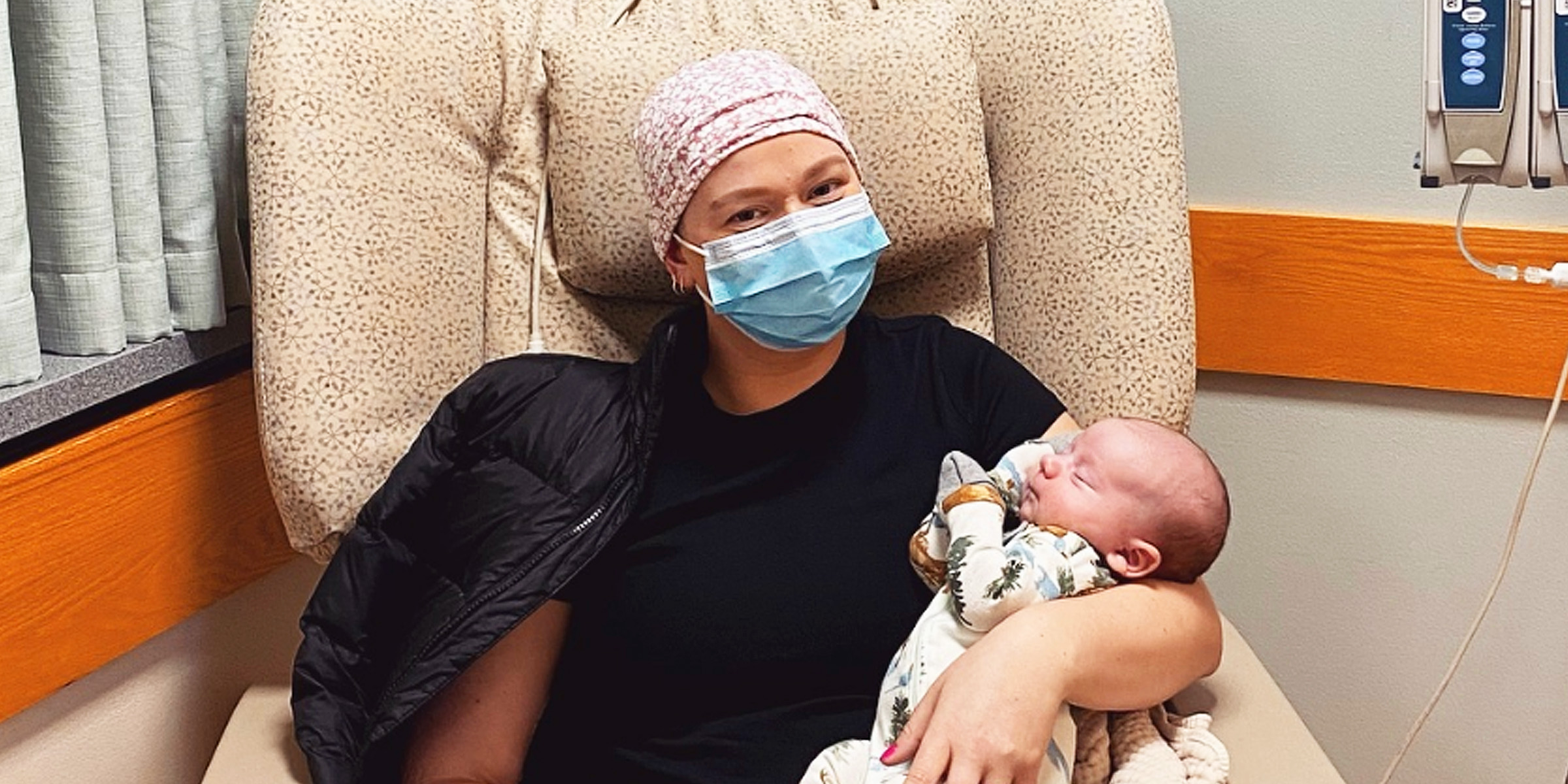
A Woman Was Thrilled to Become a Mom, but 9 Days After Giving Birth, Doctors Diagnosed Her with a Rare Cancer – Her Story
Her first Valentine's Day as a mother was shattered by a phone call delivering bad news. Eight days into chemotherapy, her hCG levels were falling, but the cancer had already spread to her lungs. Worse yet, there was a chance her newborn had it too.
From the outside, everything looked perfect. A woman in her late 20s and her husband had just welcomed their first child, a healthy baby boy, into their home in Sun Prairie, Wisconsin. The new mom was savoring the early days of motherhood, soaking in every cuddle and coo.
But a lingering infection from her prolonged labor led doctors to examine her more closely, a step that would change her life. Within days, she was no longer just a new mom. She was a cancer patient battling an aggressive, rare disease while trying to care for her infant son.
The trouble began during her labor on February 5, 2024. What should have been a straightforward delivery stretched into a grueling three-day ordeal, leaving Lydia Dutcher exhausted. Her pregnancy had been uneventful, but the prolonged and difficult labor tested her endurance. Finally, she delivered a healthy baby boy, Theodore Brandon, lovingly known as Theo.
The extended duration led to chorioamnionitis, an infection of the membranes surrounding the baby, which her doctors successfully treated with antibiotics. However, the prolonged labor and complications prompted them to send her placenta for routine testing. It was this decision that likely saved her life.
Nine days after giving birth to baby Theo, Lydia was happily making dessert when her phone rang. The 29-year-old from Sun Prairie had been looking forward to celebrating Valentine's Day 2024 with her husband, Matthew. They were both in the kitchen, mixing ingredients for a cheesecake while Theo slept nearby.
When Dr. Danielle Hartwig's name appeared on her phone, Lydia assumed it was a routine follow-up about the baby. Instead, the physician delivered news that would transform her early motherhood into a medical crisis she never saw coming.
The call was on speaker, allowing Matthew to hear as Dr. Hartwig carefully explained that testing had revealed a tumor in his wife's placenta. "I don't want to scare you, but there's not much literature. I've been researching it. I don't know really what the next steps are going to be," the doctor said.
The couple sat in stunned silence, eventually turning to Google despite medical warnings, until Theo's cries pulled them back to the present moment.
Nothing during the nine months of pregnancy had suggested the rare cancer already developing within her body, a malignancy that affects fewer than seven in 100,000 pregnancies in the United States. "I was just so excited and hopeful and ready to be a new mom and enjoy my maternity leave," she later reflected.
Lydia had developed choriocarcinoma, an aggressive cancer that forms when cells meant to create the placenta turn malignant. These trophoblast cells, which normally help an embryo connect to the uterus and allow the placenta to form, had become cancerous and were already spreading through her body.
Choriocarcinoma is particularly dangerous because it moves quickly through the bloodstream, targeting organs like the lungs, uterine muscle layer, lymph nodes, liver, kidneys, brain, and blood vessels. The cancer can develop during pregnancy or emerge after any pregnancy outcome, including miscarriage, ectopic pregnancy, or full-term birth.
About half of all cases occur after molar pregnancies when fluid-filled sacs or tumors develop inside the uterus instead of a healthy placenta, but Lydia's case was different. Her pregnancy had appeared completely normal.
Many people with choriocarcinoma experience irregular vaginal bleeding and pelvic pain, especially those who were recently pregnant. As the cancer spreads to different organs, additional symptoms can emerge: coughing or breathing difficulties when it reaches the lungs, seizures or headaches if it spreads to the brain, and abdominal pain when it affects the kidneys or liver.
Because this type of cancer spreads so quickly, early treatment is crucial. Without intervention, choriocarcinoma can be fatal, but with proper chemotherapy treatment, most cases can be cured.
The initial diagnosis was frightening enough, but three weeks after Theo's birth, scans revealed the cancer had already metastasized. Multiple small tumors dotted Lydia's lungs, confirming that this aggressive disease was advancing rapidly through her body.
"I just remember my heart dropping," she recalled. "I honestly thought I was going to die." The medical team moved quickly to begin treatment, knowing that choriocarcinoma's rapid progression meant every day mattered.
Healthcare providers treat this cancer based on its stage, rating the tumor's size and whether it has spread beyond the uterus, along with the patient's overall health and personal preferences.
The main treatment is chemotherapy, though some patients may also need surgery to remove the uterus, radiation, or a combination of treatments. Lydia's treatment started three weeks after giving birth. Hers was an intensive 10-week chemotherapy regimen designed to eliminate the cancer before it could spread further.
The treatment required PICC lines in both arms, making even simple tasks like holding her newborn son painful and challenging. As a nurse herself, Lydia understood the medical realities she faced, but nothing had prepared her for the emotional toll of fighting cancer while caring for a newborn.
The chemotherapy left her drained and nauseated, struggling to maintain her energy for basic daily activities. Simple moments like feeding Theo became complicated by her treatment schedule and physical limitations.
Matthew stepped up as the primary caregiver for their son, supported by both sets of grandparents who recognized the family's urgent need for help. The couple's extended family formed a protective circle around them, handling household tasks and infant care while Lydia focused on her treatment and recovery.
Social media became an unexpected source of strength during this period. Lydia began sharing updates about her treatment journey on Instagram, documenting both the medical challenges and small victories along the way.
Her posts revealed the raw reality of combining cancer treatment with new motherhood, including concerns about losing her hair and the physical toll of repeated chemotherapy cycles. "Day 8 of this chemo cycle is outpatient infusions," she wrote in early March 2024.
"My bHCG level has already come down after my first two infusions last week, hopefully it just keeps decreasing. Next chemo cycle will start next Monday and I'll be inpatient for two days again," she added. "Counting down the days until I lose my hair, which in the grand scheme of things sounds so stupid, but I really am sad about it."
The online community's response overwhelmed the family with generosity. More than 60 mothers from across their network offered to donate breast milk, ensuring Theo could continue receiving optimal nutrition while his mother underwent treatment.
"I felt really supported and looked out for during the whole time," Lydia remembered, appreciating how strangers became allies in her fight against cancer. Her Instagram followers rallied around her with encouraging messages that lifted her spirits during the most challenging moments.
"I'm so proud of you!! You are doing amazing!" one supporter commented. Another called her "one strong, badass mama." A third added, "You got this, mama 💪🏼🤍," while another reassured, "Sending you lots of love."
These digital embraces from her online community provided emotional fuel when her physical strength was depleted by treatment. Thankfully, treatment monitoring revealed encouraging progress as weeks passed.
Lydia's human chorionic gonadotropin (hCG) levels, key markers for this type of cancer, began dropping consistently after each chemotherapy session. This was an indication that the treatment was working. Follow-up lung scans showed a mixed but hopeful picture.
Some nodules had disappeared completely, others had shrunk significantly, and only a few remained unchanged. The medical team tracked these improvements carefully, knowing that choriocarcinoma treatment requires the complete elimination of all cancer cells to prevent recurrence.
"Chemo cycle 3. Starting to feel the side effects more and more each week, but that's to be expected," Lydia posted in late March. "Had to get my 3rd PICC line because my last one was getting infected. Praying I don't have issues with this new one, otherwise they will just place a port."
Despite the physical challenges, Lydia found strength in small victories and the knowledge that her treatment was working. Each clean scan and dropping hCG level brought her closer to the goal of complete remission.
The medical team's plan called for continuing chemotherapy until her hCG levels reached zero and all lung nodules had disappeared completely. Throughout the treatment process, one fear constantly occupied Lydia's thoughts: whether the cancer had affected Theo during pregnancy.
Choriocarcinoma can potentially spread to a developing fetus, but extensive testing revealed that her son had been completely unaffected by her condition. The healthy, active baby she held during treatment appointments represented hope and motivation to keep fighting.
By April 2024, Lydia's perseverance through the grueling treatment schedule had paid off. Her hCG levels had dropped to undetectable ranges, and scans showed no remaining evidence of cancer in her lungs or elsewhere in her body.
On April 29, 2024, she shared the news her family had been hoping for. "Officially cancer free," she shared on Instagram.
The diagnosis that had threatened to destroy her early motherhood had been defeated, but the experience left lasting impacts on how Lydia views her life and family. More than a year later, she continues monthly hCG monitoring to ensure the cancer hasn't returned, though her doctors expect her to remain in remission.
The infection that had made her labor so difficult ultimately proved fortuitous. Without the chorioamnionitis that prompted placenta testing, Lydia's cancer might not have been discovered until it spread to her brain. At that time, treatment would have been far more complicated and potentially less successful.
Over a year later, 15-month-old Theo is a healthy, active toddler who loves playing outside, completely unaware of the medical crisis that surrounded his first months of life. "He's perfect," his mother recently said.
Lydia's doctors have given her encouraging news about future pregnancies. While another pregnancy would require careful monitoring due to her medical history, there's no medical reason she couldn't have more children if she chooses.
The cancer that once threatened her life and motherhood has been eliminated, leaving her free to focus on raising Theo and planning for whatever comes next. The experience has given Lydia a unique perspective on both motherhood and survival.
She and Matthew are already thinking about how they'll eventually tell Theo about his mother's cancer diagnosis and treatment during his infancy. It will be a story of survival and resilience, community support, and medical success, but also of how precious and fragile life can be.
The information in this article is not intended or implied to be a substitute for professional medical advice, diagnosis or treatment. All content, including text, and images contained on news.AmoMama.com, or available through news.AmoMama.com is for general information purposes only. news.AmoMama.com does not take responsibility for any action taken as a result of reading this article. Before undertaking any course of treatment please consult with your healthcare provider.
